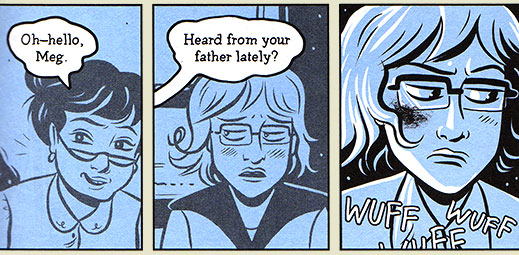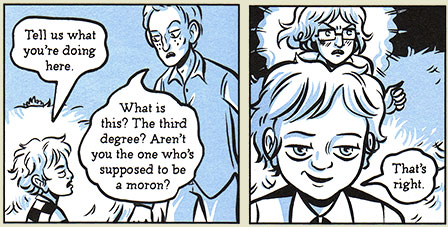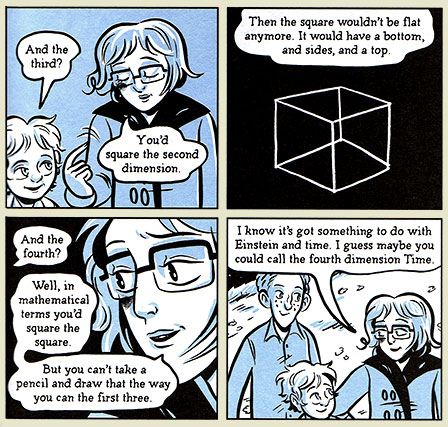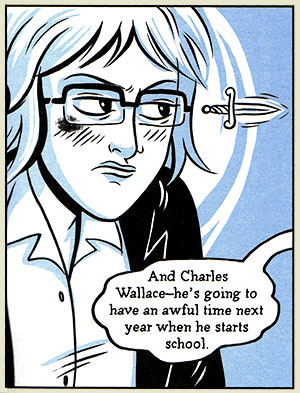A Wrinkle in Time
Adaptations from literature into the comics form have it pretty rough. It's not like with movies where a charismatic star or a sublime musical score can provide lift for a work. Unless an adapter is wildly liberal in the work of adaptation, comics have exactly two things to work with: writing (provided largely by the original author) and art through which to carry forth the dialogical and narrative aspects of the work (respectively). It's not an easy task and the very nature of the transition is positioned as a serious obstacle to the success of any adaptation.
Mediocre creators produce dreadful (though sometimes hilarious) works, like Marvel's recent attempt to bring Pride & Prejudice to the medium and the recent re-interpretation of Dostoyevsky, The Grand Inquisitor . Even works backed by incredible, no-fail talents like Eric Shanower and Skottie Young can falter and produce books that are merely enjoyable. Successful transfers of literature into the comics medium are exceedingly rare. Jiro Taniguchi's adaptation of Jack London and Humayoun Ibrahim's adaptation of Jack Vance are two examples—both do a good job of pacing story for the medium and using storytelling tools unique to comics in order to bring the reader into a special experience of an already existing story.
 This lady, who is old enough to know better, is being petty and mean.
This lady, who is old enough to know better, is being petty and mean.
Hope Larson is immensely talented and one of my favourite comics illustrators, but unfortunately her adaptation of A Wrinkle in Time fares no better than Shanower and Young's Wonderful Wizard of Oz. Like Oz, her Wrinkle in Time boasts a number of charms and excellencies, but the whole package fails to be Completely Wonderful. I was hoping for Completely Wonderful based both on my prior experience of Larson's work and how much excitement my friends had when I said I'd be reading Wrinkle in Time—perhaps it was those hopes and expectations that dimmed my love for the book. Also: it may be fair to disclose that a book has to be particularly spectacular for me to overlook my weariness of fantasy settings.11Even Miyuki Miyabe's Brave Story, which I loved inordinately, suffered a flagging of interest when the book's young protagonist—after two-hundred pages of stupendous-but-mundane earthbound narrative—gets whisked away to a realm of fantasy.
For the first hundred pages of Larson's adaptation, I was perhaps unreasonably excited by the prospect of there being a whole three hundred more pages to the story—and then four more original prose novels after that. I had even been prompted by my enjoyment of the adaptation to visit the library and pick up Madeleine L'Engle's original Wrinkle in Time, thinking that perhaps I would finish reading Larson's book and then read L'Engles in order to add some colour to my review. That first hundred pages all occurs in our real, tangible, and not very sci-fi or fantasy world. It was delicious and Larson's play with these characters was delightful. I thought that I would want to spend hundreds and perhaps thousands of pages with these characters. Then the world-hopping began. I'm returning L'Engle's novel to the library unread. Maybe I'll read it to my daughter someday if she likes, but I no longer feel an urgent need to revisit these characters or their adventures.

While things don't immediately begin a downhill slide (and I don't even know that slide would ever be an accurate description of how my disappointments in the book took form) with the bending of timespace, that was where my easy alliance with the story began to strain. From this point onward, Larson's Wrinkle in Time experiences increasingly poor pacing until in the last ninety pages when things begin happening so abruptly that it's hard to get footing enough to buy into the motives of various characters' actions. Protagonist Meg establishes a close relationship with an alien creature after what seems like a few minutes' conversation—something that feels untrue to her character as established. Likewise, a romantic pairing springs up with barely more pretense than Thor and Jane's spontaneous romantic combustion in last year's Thor movie. Everything feels rushed and uneven and I stopped trying to guess what characters would do in the situations they experienced and simply decided I was now in it strictly to find out What Happens. And after this book's stellar beginning, this was a disappointment.
 Science!
Science!
And of course, it's not all bad. Larson's art and visual characterization are superb. She constantly brings a sense of moment to the individual reactions of her characters. What initially won me over so strongly to her creative vision here (before the narrative intervened) was her depictions of the inscrutable Charles Wallace. Larson is one of those comics artists who is actually able to illustrate a range of expressions in her characters. A quick survey of the available product in the medium will highlight exactly what a great gift that is. By her treatment of the three primary child-characters before the adventure begins, I was completely wrapped up in the mystery of their everyday lives. A book of Meg, Calvin, and Charles Wallace just sitting around interacting with each other in the grip of thoroughly non-extraordinary circumstances would be fabulous. Maybe they could go on walks occasionally. Throw stones at abandoned beehives or something.
*sigh* I'm in love with a book that doesn't exist.

I'm torn on how much to recommend Hope Larson's Wrinkle in Time. On the one hand, her art is beautiful and serves only to elevate the work. On the other, issues in pacing made it difficult to remain involved in the kids' adventure. It's possible that another hundred pages of padding—of focus on characterization—could have eased some of the alacrity with which the story spins itself out. I don't envy the task of the adapter because too often even great talents like Larson cannot emerge victorious against the challenges adaptations provoke.
Additional Note
One question I always struggle with when approaching an adaptation is how much blame to lay at the feet of the adapter if the adaptation is not a great product. After all, what if the inadequacies are intrinsic to the original work? In the present case, it may very well be that Hope Larson has faithfully adapted A Wrinkle in Time and the issues I had with the book are present in the original as well. I suppose that's fair enough and fans of the original will probably appreciate such deep fidelity, but for my part, I prefer that adapters improve on their source.
Examples here: Fight Club, Snow Falling on Cedars, and Patricia Rozema's Mansfield Park. Mansfield Park is a fairly liberal translation of Austen's novel and reframes the context of the book to make a particular political statement only hinted at broadly within Austen's original work; but better still, Rozema alters the character of Austen's protagonist in such a way that the movie is actually enjoyable—a faithful adaptation would be painful to watch. Snow Falling on Cedars is a faithful adaptation that improves its source by simply shuffling the narrative into a series of non-sequential skips through the story's timeline. This increases the film's drama and makes it a slightly more enjoyable experience than the book upon which it is based. I haven't read Palahniuk's Fight Club, but even he agrees that David Fincher improved the work and made the story his own.
This is what I had hoped of Larson, regardless of whether the original had the same deficiencies. I don't hold it against her because adaptation is very difficult and adaptation that actually improves a work is more difficult by far.
Good Ok Bad features reviews of comics, graphic novels, manga, et cetera using a rare and auspicious three-star rating system. Point systems are notoriously fiddly, so here it's been pared down to three simple possibilities:
3 Stars = Good
2 Stars = Ok
1 Star = Bad
I am Seth T. Hahne and these are my reviews.
Browse Reviews By
Other Features
- Best Books of the Year:
- Top 50 of 2024
- Top 50 of 2023
- Top 100 of 2020-22
- Top 75 of 2019
- Top 50 of 2018
- Top 75 of 2017
- Top 75 of 2016
- Top 75 of 2015
- Top 75 of 2014
- Top 35 of 2013
- Top 25 of 2012
- Top 10 of 2011
- Popular Sections:
- All-Time Top 500
- All the Boardgames I've Played
- All the Anime Series I've Seen
- All the Animated Films I've Seen
- Top 75 by Female Creators
- Kids Recommendations
- What I Read: A Reading Log
- Other Features:
- Bookclub Study Guides











